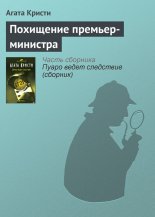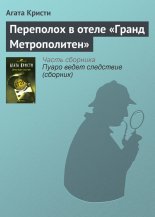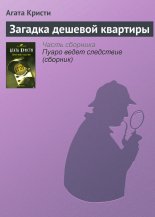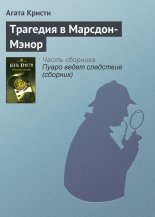Убийства по алфавиту Кристи Агата
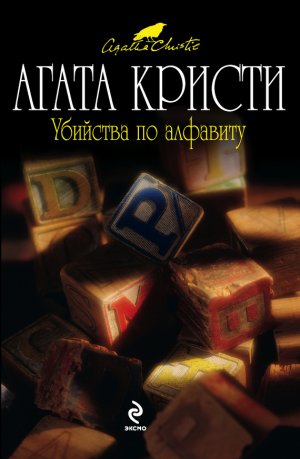
Английский язык с Агатой Кристи. Убийства по алфавиту
Английский язык с Агатой Кристи. Убийства по алфавиту
Agatha Christie
The ABC Murders
Метод чтения Ильи Франка
Каждый текст разбит на небольшие отрывки. Сначала идет адаптированный отрывок — текст с вкрапленным в него дословным русским переводом и небольшим лексическим комментарием. Затем следует тот же текст, но уже неадаптированный, без подсказок.
Те, кто только начал осваивать какой-либо язык, сначала может читать текст с подсказками, затем — тот же текст без подсказок. Если при этом он забыл значение какого-либо слова, но в целом все понятно, то необязательно искать это слово в отрывке с подсказками. Оно еще встретится — и не раз. Смысл неадаптированного текста как раз в том, что какое-то время — пусть короткое — читающий на чужом языке «плывет без доски». После того, как он прочитает неадаптированный текст, нужно читать следующий адаптированный. И так далее. Возвращаться назад — с целью повторения — не нужно. Следует просто продолжать читать дальше.
Конечно, сначала на вас хлынет поток неизвестных слов и форм. Этого не нужно бояться: никто никого по ним не экзаменует. По мере чтения (пусть это произойдет хоть в середине или даже в конце книги) все «утрясется», и вы будете, пожалуй, удивляться: «Ну зачем опять дается перевод, зачем опять приводится исходная форма слова, все ведь и так понятно!» Когда наступает такой момент, «когда и так понятно», стоит уже читать наоборот: сначала неадаптированную часть, а потом заглядывать в адаптированную. (Этот же способ чтения можно рекомендовать и тем, кто осваивает язык не с нуля.)
Язык по своей природе — средство, а не цель, поэтому он лучше всего усваивается не тогда, когда его специально учат, а когда им естественно пользуются — либо в живом общении, либо погрузившись в занимательное чтение. Тогда он учится сам собой, подспудно.
Наша память тесно связана с тем, что мы чувствуем в какой-либо конкретный момент, зависит от нашего внутреннего состояния, от того, насколько мы «разбужены» сейчас (а не от того, например, сколько раз мы повторим какую-нибудь фразу или сколько выполним упражнений).
Для запоминания нужна не сонная, механическая зубрежка или вырабатывание каких-то навыков, а новизна впечатлений. Чем несколько раз повторить слово, лучше повстречать его в разных сочетаниях и в разных смысловых контекстах. Основная масса общеупотребительной лексики при том чтении, которое вам предлагается, запоминается без зубрежки, естественно — за счет повторяемости слов. Поэтому, прочитав текст, не нужно стараться заучить слова из него. «Пока не усвою, не пойду дальше» — этот принцип здесь не подходит. Чем интенсивнее человек будет читать, чем быстрее бежать вперед — тем лучше. В данном случае, как ни странно, чем поверхностнее, чем расслабленнее, тем лучше. И тогда объем материала делает свое дело, количество переходит в качество. Таким образом, все, что требуется от читателя, — это просто почитывать, думая не об иностранном языке, который по каким-либо причинам приходится учить, а о содержании книги.
Если вы действительно будете читать интенсивно, то метод сработает. Главная беда всех изучающих долгие годы один какой-либо язык в том, что они занимаются им понемножку, а не погружаются с головой. Язык — не математика, его надо не учить, к нему надо привыкать. Здесь дело не в логике и не в памяти, а в навыке. Он скорее похож в этом смысле на спорт, которым нужно заниматься в определенном режиме, так как в противном случае не будет результата. Если сразу и много читать, то свободное чтение на новом языке — вопрос трех-четырех месяцев (начиная «с нуля»). А если учить помаленьку, то это только себя мучить и буксовать на месте. Язык в этом смысле похож на ледяную горку — на нее надо быстро взбежать. Пока не взбежите — будете скатываться. Если достигается такой момент, что человек свободно читает, то он уже не потеряет этот навык и не забудет лексику, даже если возобновит чтение на этом языке лишь через несколько лет. А если не доучил — тогда все выветрится.
А что делать с грамматикой? Собственно для понимания текста, снабженного такими подсказками, знание грамматики уже не нужно — и так все будет понятно. А затем происходит привыкание к определенным формам — и грамматика усваивается тоже подспудно. Это похоже на то, как осваивают же язык люди, которые никогда не учили его грамматики, а просто попали в соответствующую языковую среду. Я говорю это не к тому, чтобы вы держались подальше от грамматики (грамматика — очень интересная и полезная вещь), а к тому, что приступать к чтению подобной книги можно и без особых грамматических познаний, достаточно самых элементарных. Данное чтение можно рекомендовать уже на самом начальном этапе.
Такие книги помогут вам преодолеть важный барьер: вы наберете лексику и привыкнете к логике языка, сэкономив много времени и сил.
Илья Франк, [email protected]
Foreword by Captain Arthur Hastings, O.B.E.
(предисловие /написано/ капитаном Артуром Гастингсом, /кавалером/ ордена Британской Империи)
In this narrative of mine (в этом моем повествовании) I have departed from my usual practice (я уклонился от моей обычной практики; to depart — отправляться; уезжать; уклоняться) of reporting only those incidents and scenes (докладывать/сообщать только о тех происшествиях и событиях; incident — случай, случайность; происшествие, событие, эпизод; scene — место действия; место происшествия; сцена; явление) at which I myself was present (в которых я сам участвовал: «присутствовал»; to be present at — присутствовать).
Certain chapters, therefore (некоторые главы поэтому), are written in the third person (написаны в третьем лице; to write — писать).
incident ['InsId@nt], scene [si:n], therefore ['DE@fO:]
In this narrative of mine I have departed from my usual practice of reporting only those incidents and scenes at which I myself was present.
Certain chapters, therefore, are written in the third person.
I wish to assure my readers (я желаю заверить моих читателей) that I can vouch for the occurrences (что я могу поручиться за случаи) related in these chapters (изложенные в этих главах; to relate — относиться; рассказывать). If I have taken a certain poetic license (если я позволил /себе/ определенную поэтическую вольность; to take — брать; принимать; license / licence — лицензия; право; свобода действий) in describing the thoughts and feelings of various persons (при описании мыслей и чувств различных людей), it is because I believe (это потому, что я верю) I have set them down with a reasonable amount of accuracy (что я описал их с разумной точностью: «с разумным количеством точности»; to set down — класть; устанавливать; письменно излагать). I may add (я могу добавить) that they have been "vetted" (что, они были «проверены на благонадежность»; to vet — лечить животных; проверять; исправлять) by my friend Hercule Poirot himself (моим другом, самим Эркюлем Пуаро).
vouch [vautS], occurrence [@'k@:r@ns], Hercule Poirot ['E@kju:l 'pwA:r@U]
I wish to assure my readers that I can vouch for the occurrences related in these chapters. If I have taken a certain poetic license in describing the thoughts and feelings of various persons, it is because I believe I have set them down with a reasonable amount of accuracy. I may add that they have been "vetted" by my friend Hercule Poirot himself.
In conclusion (в заключение), I will say that (я скажу, что) if I have described at too great length (если я описал в слишком большом объеме: «длине») some of the secondary personal relationships (некоторые из второстепенных личных отношений) which arose (которые возникли; to arise — возникать; появляться) as a consequence of this strange series of crimes (как последствие этой странной серии преступлений), it is because the human and personal element can never be ignored (это /случилось/ потому, что человека и человеческий фактор нельзя проигнорировать: «человеческий и личностный элемент никогда не может быть проигнорирован»). Hercule Poirot once taught me in a very dramatic manner (Эркюль Пуаро однажды научил меня в очень драматической манере; to teach — учить, обучать) that romance can be a by-product of crime (что романтические отношения могут быть побочным продуктом преступления; romance — роман; любовные отношения).
consequence ['kOnsIkw@ns], series ['sI@ri:z], taught [tO:t]
In conclusion, I will say that if I have described at too great length some of the secondary personal relationships which arose as a consequence of this strange series of crimes, it is because the human and personal element can never be ignored. Hercule Poirot once taught me in a very dramatic manner that romance can be a by-product of crime.
As to the solving of the A.B.C. mystery (что касается решения тайны Эй-би-си; A.B.C. — первые буквы английского алфавита), I can only say (я только могу сказать) that in my opinion (что, по моему мнению) Poirot showed real genius in the way (Пуаро проявил настоящий гений в том, как; way — путь; метод, средство, способ, образ действий) he tackled a problem (он взялся за проблему; to tackle — привязывать, укреплять; с усердием приниматься /за что-л./; пытаться найти решение) entirely unlike any (совершенно не похожую ни на одну /из тех/) which had previously come his way (которые раньше встречались /на/ его пути).
mystery ['mIst(@)rI], genius ['dZInj@s], previous ['pri:vj@s]
As to the solving of the A.B.C. mystery, I can only say that in my opinion Poirot showed real genius in the way he tackled a problem entirely unlike any which had previously come his way.
I. The Letter
(письмо)
It was in June of 1935 (это было в июне тысяча девятьсот тридцать пятого /года/) that I came home from my ranch in South America (когда я приехал домой с моего ранчо в Южной Америке; to come — приходить; прибывать) for a stay of about six months (примерно на шесть месяцев: «для пребывания в течение примерно шести месяцев»). It had been a difficult time for us out there (там для нас были трудные времена). Like everyone else (как и все), we had suffered from world depression (мы пострадали от мирового кризиса). I had various affairs to see to in England (в Англии мне нужно было заняться разными делами: «у меня были различные дела /чтобы о них/ позаботиться в Англии»; to see to — присматривать за чем-л., кем-л., заботиться о чем-л., ком-л.) that I felt could only be successful (которые, /как/ я чувствовал, могли быть успешными только; to feel — чувствовать) if a personal touch was introduced (при моем личном участии: «если личное касание будет применено»; to introduce — вводить; знакомить; вносить). My wife remained to manage the ranch (моя жена осталась управлять ранчо).
ranch [r&ntS], various ['vE@rI@s], affair [@'fE@]
It was in June of 1935 that I came home from my ranch in South America for a stay of about six months. It had been a difficult time for us out there. Like everyone else, we had suffered from world depression. I had various affairs to see to in England that I felt could only be successful if a personal touch was introduced. My wife remained to manage the ranch.
I need hardly say (едва ли мне нужно говорить) that one of my first actions on reaching England (что, одно из моих первых действий по прибытии в Англию) was to look up my old friend (было навестить моего старого друга; to look up — разг. навещать кого-л.), Hercule Poirot (Эркюля Пуаро).
I found him installed (я обнаружил его расположившимся; to find — находить; to install — расположиться; устанавливать) in one of the newest type of service flats in London (в Лондоне, в одной из квартир новейшего типа с /гостиничным/ обслуживанием). I accused him (я обвинил его /в том, что он/) (and he admitted the fact (и он признал этот факт)) of having chosen this particular building (выбрал именно это здание; to choose — выбирать) entirely on account of its strictly geometrical appearance and proportions (исключительно на основании его строгого геометрического вида и пропорций).
install [Ins'tO:l], particular [p@'tIkjul@], appearance [@'pI@r@ns]
I need hardly say that one of my first actions on reaching England was to look up my old friend, Hercule Poirot.
I found him installed in one of the newest type of service flats in London. I accused him (and he admitted the fact) of having chosen this particular building entirely on account of its strictly geometrical appearance and proportions.
"But yes, my friend (ну да, мой друг), it is of a most pleasing symmetry (дело как раз в приятной симметрии: «оно самой приятной симметрии»), do you not find it so (вы так не находите)?"
I said that I thought (я сказал, что я думал; to say — говорить, сказать; to think — думать) there could be too much squareness (что оно, вероятно, слишком квадратное: «там могло быть слишком много квадратности»; square — квадрат; площадь) and, alluding to an old joke (и, намекая на старую шутку; to allude — ссылаться; намекать), I asked (я спросил) if in this super-modern hostelry they managed to induce hens to lay square eggs (не удалось ли им в этой сверхсовременной гостинице заставить куриц нести квадратные яйца: «откладывать квадратные яйца»; to induce — заставлять, вынуждать)?
Poirot laughed heartily (Пуаро рассмеялся от всего сердца: «сердечно»).
"Ah, you remember that (а, вы помните это)? Alas (увы)! No (нет) — science has not yet induced the hens to conform to modern tastes (наука еще не вынудила куриц соответствовать современным вкусам), they still lay eggs of different sizes and colours (они все еще несут яйца разных размеров и цветов)!"
square [skwE@], hostelry ['hOst@lrI], science ['saI@ns]
"But yes, my friend, it is of a most pleasing symmetry, do you not find it so?"
I said that I thought there could be too much squareness and, alluding to an old joke, I asked if in this super-modern hostelry they managed to induce hens to lay square eggs?
Poirot laughed heartily.
"Ah, you remember that? Alas! No — science has not yet induced the hens to conform to modern tastes, they still lay eggs of different sizes and colours!"
I examined my old friend with an affectionate eye (я осмотрел моего старого друга дружелюбным взглядом; affection — любовь, чувство близости, привязанность). He was looking wonderfully well (он выглядел удивительно хорошо) — hardly a day older (едва ли на день старше) than when I had last seen him (чем, когда я видел его в последний раз; to see — видеть).
"You're looking in fine fettle, Poirot," I said (вы хорошо выглядите: «вы выглядите в отличном состоянии», Пуаро, — я сказал; fettle — положение, состояние). "You've hardly aged at all (вы вовсе едва постарели; age — возраст; старость; век). In fact (фактически), if it were possible (если бы это было возможно), I should say (я бы сказал) that you had fewer grey hairs than (что у вас меньше седых волос, чем; grey — серый; седой) when I saw you last (когда я вас видел в последний раз; to see)."
affectionate [@'fekSnIt], should [SUd], hair [hE@]
I examined my old friend with an affectionate eye. He was looking wonderfully well — hardly a day older than when I had last seen him.
"You're looking in fine fettle, Poirot," I said. "You've hardly aged at all. In fact, if it were possible, I should say that you had fewer grey hairs than when I saw you last."
Poirot beamed on me (Пуаро радостно мне улыбнулся; to beam — сиять; радостно улыбаться). "And why is that not possible (и почему же это невозможно)? It is quite true (это чистая правда: «это вполне истинно»)."
"Do you mean (вы имеете в виду) your hair is turning from grey to black (что ваши волосы становятся из седых черными; to turn — поворачиваться; становиться) instead of from black to grey (вместо того, что бы из черных — седыми)?"
"Precisely (совершенно верно)."
"But surely that's a scientific impossibility (но, действительно, это невозможно с научной точки зрения: «это научная невозможность»)!"
"Not at all (совсем нет)."
"But that's very extraordinary (но это очень необычно). It seems against nature (это кажется противным природе)."
beam [bi:m], precisely [prI'saIslI], extraordinary [,ekstr'O:dInrI]
Poirot beamed on me. "And why is that not possible? It is quite true."
"Do you mean your hair is turning from grey to black instead of from black to grey?"
"Precisely."
"But surely that's a scientific impossibility!"
"Not at all."
"But that's very extraordinary. It seems against nature."
"As usual, Hastings (как обычно, Гастингс), you have the beautiful and unsuspicious mind (у вас прекрасный и ничего не подозревающий ум; to suspect — подозревать). Years do not change that in you (годы не меняют этого в вас)! You perceive a fact (вы воспринимаете факт) and mention the solution of in it the same breath (и выдаете его разъяснение на одном дыхании: «упоминаете его разъяснение на том же дыхании») without noticing (не замечая: «без замечания») that you are doing so (что вы так делаете)!"
I stared at him puzzled (я уставился на него озадаченно).
Without a word (не говоря ни слова: «без слова») he walked into his bedroom (он прошел к себе в спальню) and returned with a bottle in his hand (и вернулся с бутылочкой в руке) which he handed to me (которую он передал мне).
I took it (я взял ее; to take — брать, принимать), for the moment uncomprehending (некоторое время /ничего/ не понимая; to comprehend — понимать, постигать, соображать).
unsuspicious ['Vns@s'pIS@s], perceive [p@'si:v], uncomprehending [,VnkOmprI'hendIN]
"As usual, Hastings, you have the beautiful and unsuspicious mind. Years do not change that in you! You perceive a fact and mention the solution of it in the same breath without noticing that you are doing so!"
I stared at him puzzled.
Without a word he walked into his bedroom and returned with a bottle in his hand which he handed to me.
I took it, for the moment uncomprehending.
It bore the words (на ней были слова: «она несла слова»; to bear — нести): REVIVIT («Ревивит») — To bring back the natural tone of the hair (восстанавливает естественный тон волос; to bring back — возвращать; восстанавливать). REVIVIT is NOT a dye («Ревивит» не является красителем). In five shades (в пяти оттенках), Ash (пепельный), Chestnut (каштановый), Titian (золотисто-каштановый), Brown (коричневый), Black (черный).
"Poirot," I cried (Пуаро, — закричал я). "You have dyed your hair (вы покрасили ваши волосы)!"
"Ah, the comprehension comes to you (а, понимание приходит к вам)!"
"So that is why (так вот почему) your hair looks so much blacker than it did last time I was back (ваши волосы выглядят гораздо чернее, чем они выглядели в прошлый раз, когда я возвращался; to be back — вернуться)."
"Exactly (точно)."
dye [daI], Titian ['tIS(@)n], comprehension [,kOmprI'henS(@)n]
It bore the words: REVIVIT — To bring back the natural tone of the hair. REVIVIT is NOT a dye. In five shades, Ash, Chestnut, Titian, Brown, Black.
"Poirot," I cried. "You have dyed your hair!"
"Ah, the comprehension comes to you!"
"So that is why your hair looks so much blacker than it did last time I was back."
"Exactly."
"Dear me," I said (Боже мой, — я сказал; Dear me — устойчивое выражение 'Боже мой'), recovering from the shock (приходя в себя после потрясения; to recover — приходить в себя; исцелять, излечиваться). "I suppose (я полагаю) next time I come home (в следующий раз, /когда/ я приеду домой) I shall find you wearing false moustaches (я увижу вас носящим накладные усы: «фальшивые усы») — or are you doing so now (или вы сейчас это делаете)?"
Poirot winced (Пуаро сморщился; to wince — вздрагивать; морщиться). His moustaches had always been his sensitive point (его усы всегда были его слабым местом: «чувствительным местом»). He was inordinately proud of them (он чрезмерно ими гордился; inordinate — неумеренный; чрезмерный; to be proud — гордиться). My words touched him on the raw (мои слова задели его за живое; raw — что-л. сырое; больное место).
"No (нет), no (нет), indeed, mon ami (на самом деле, фр. мой друг). That day (тот день), I pray the good God (я молю праведного Бога), is still far off (все еще далеко). The false moustaches (накладные усы)! Quelle horreur (фр. какой ужас)!"
false [fO:ls], moustaches [m@s'tA:SIz], raw [rO:]
"Dear me," I said, recovering from the shock. "I suppose next time I come home I shall find you wearing false moustaches — or are you doing so now?"
Poirot winced. His moustaches had always been his sensitive point. He was inordinately proud of them. My words touched him on the raw.
"No, no, indeed, mon ami. That day, I pray the good God, is still far off. The false moustaches! Quelle horreur!"
He tugged at them vigorously to assure me of their genuine character (он энергично потянул за них, чтобы убедить меня в их подлинности: «подлинном качестве»; character — характер; качество).
"Well, they are very luxuriant still," I said (ну, они все еще очень густые, — сказал я; luxuriant — буйный, пышный, богатый; luxury — богатство, роскошь).
"N'est-ce pas (фр. не так ли)? Never (никогда), in the whole of London (во всем Лондоне), have I seen a pair of moustaches to equal mine (я /не/ видел пары усов, равной моим)."
A good job too (вот это удача; job — работа, труд; a good job — разг. вот удача; здорово), I thought privately (я подумал про себя: «лично»). But I would not for the world have hurt Poirot's feelings (но я бы никогда в жизни не задел чувства Пуаро; to hurt — причинять боль; ранить; world — мир, вселенная; общество; перен. судьба, жизнь) by saying so (сказав так /вслух/).
Instead I asked (вместо /этого/ я спросил) if he still practiced his profession on occasions (занимается ли он по случаю все еще своей профессией; to practice — применять; тренировать; практиковать; occasion — случай; повод; происшествие).
"I know," I said (я знаю), "that you actually retired years ago (что вы в действительности отошли от дел /много/ лет назад; to retire — выходить в отставку, на пенсию)."
vigorously ['vIg@r@slI], genuine ['dZenjuIn], luxuriant [lVg'zju@rI@nt]
He tugged at them vigorously to assure me of their genuine character.
"Well, they are very luxuriant still," I said.
"N'est-ce pas? Never, in the whole of London, have I seen a pair of moustaches to equal mine."
A good job too, I thought privately. But I would not for the world have hurt Poirot's feelings by saying so.
Instead I asked if he still practiced his profession on occasions.
"I know," I said, "that you actually retired years ago."
"C'est vrai (фр. это правда). To grow the vegetable marrows (чтобы выращивать кабачки; vegetable marrow — бот. кабачок)! And immediately a murder occurs (и немедленно происходит убийство) — and I send the vegetable marrows to promenade themselves to the devil (и я отправляю эти кабачки прогуляться к дьяволу). And since then (и с тех пор) — I know very well (я очень хорошо знаю) what you will say (что вы скажете) — I am like the Prima Donna (я подобен примадонне) who makes positively the farewell performance (которая решительно дает прощальный спектакль; positive — позитивный; точный; уверенный; to perform — выполнять; представлять, играть)! That farewell performance (этот прощальный спектакль), it repeats itself an indefinite number of times (он повторяется неопределенное количество раз)!"
marrow ['m&r@U], farewell ['fE@'wel], performance [p@'f O:m@ns]
"C'est vrai. To grow the vegetable marrows! And immediately a murder occurs — and I send the vegetable marrows to promenade themselves to the devil. And since then — I know very well what you will say — I am like the Prima Donna who makes positively the farewell performance! That farewell performance, it repeats itself an indefinite number of times!"
I laughed (я засмеялся).
"In truth (по правде), it has been very like that (это очень похоже на то). Each time I say (каждый раз я говорю): This is the end (это конец). But no (но нет), something else arises (что-нибудь еще возникает)! And I will admit it (и я признаю это), my friend (друг мой), the retirement I care for it not at all (отставка не по мне: «отставка, мне совсем это не нравится»; to care for — нравиться; заботиться). If the little grey cells are not exercised (если маленькие серые клеточки не используют; to exercise — применять; упражнять), they grow the rust (они притупляются: «они обрастают ржавчиной»)."
laugh [lA:f], cell [sel], exercise ['eks@saIz]
I laughed.
"In truth, it has been very like that. Each time I say: This is the end. But no, something else arises! And I will admit it, my friend, the retirement I care for it not at all. If the little grey cells are not exercised, they grow the rust."
"I see," I said (понятно: «я вижу»). "You exercise them in moderation (вы умеренно их тренируете; moderation — умеренность, сдержанность)."
"Precisely (совершенно верно). I pick and choose (я разборчив: «я подбираю и выбираю»). For Hercule Poirot nowadays only the cream of crime (для Эркюля Пуаро в наши дни только сливки преступления)."
"Has there been much cream about (и было много сливок)?"
"Pas mal (фр. немало: «неплохо»). Not long ago I had a narrow escape (не так давно я едва спасся; to have a narrow escape — с трудом спастись)."
"Of failure (от провала; to fail — терпеть неудачу, не иметь успеха)?"
"No (нет), no (нет)." Poirot looked shocked (Пуаро выглядел шокированным). "But I (но я) — I (я), Hercule Poirot (Эркюль Пуаро), was nearly exterminated (был практически уничтожен; to exterminate — искоренять; истреблять)."
I whistled (я присвистнул).
"An enterprising murderer (рисковый убийца; enterprise — предприятие, рискованный проект, рискованное занятие)!"
failure ['feIlj@], exterminate [eks't@:mIneIt], whistle [wIsl]
"I see," I said. "You exercise them in moderation."
"Precisely. I pick and choose. For Hercule Poirot nowadays only the cream of crime."
"Has there been much cream about?"
"Pas mal. Not long ago I had a narrow escape."
"Of failure?"
"No, no." Poirot looked shocked. "But I — I, Hercule Poirot, was nearly exterminated."
I whistled.
"An enterprising murderer!"
"Not so much enterprising as careless (не столько рисковый, сколько беспечный)," said Poirot. "Precisely that (именно так) — careless (беспечный). But let us not talk of it (но давайте не будем говорить об этом). You know, Hastings (вы знаете, Гастингс), in many ways I regard you as my mascot (во многих отношениях я считаю вас своим талисманом: «я рассматриваю вас как свой талисман»; to regard — расценивать, рассматривать; считать)."
"Indeed?" I said (на самом деле). "In what ways (в каких отношениях)?"
Poirot did not answer my question directly (Пуаро не ответил на мой вопрос прямо). He went on (он продолжил; to go on): "As soon as I heard (как только я услышал: «так скоро как я услышал») you were coming over (что вы приезжаете; to hear — слышать) I said to myself (я сказал себе): Something will arise (что-нибудь возникнет). As in former days we will hunt together (как в былые времена мы будем охотиться вместе), we two (мы вдвоем). But if so (но если так) it must be no common affair (это должно быть необычным делом). It must be something (это должно быть что-то /особенное/)" — he waved his hands excitedly (он оживленно взмахнул руками; to excite — побуждать; возбуждать) — "something recherch (что-то фр. избранное/изысканное) — delicate (искусное) — fine (изящное; fine — тонкий, изящный; высокий, хороший, точный) …" He gave the last untranslatable word its full flavour (он придал этому последнему непереводимому слову его полный вкус; flavour — вкус; аромат; особенность; изюминка; to give — давать).
excitedly [Ik'saItIdlI], delicate ['delIkIt], flavour ['fleIv@]
"Not so much enterprising as careless," said Poirot. "Precisely that — careless. But let us not talk of it. You know, Hastings, in many ways I regard you as my mascot."
"Indeed?" I said. "In what ways?"
Poirot did not answer my question directly. He went on: "As soon as I heard you were coming over I said to myself: Something will arise. As in former days we will hunt together, we two. But if so it must be no common affair. It must be something" — he waved his hands excitedly — "something recherch — delicate — fine." He gave the last untranslatable word its full flavour.
"Upon my word, Poirot," I said (честное слово, Пуаро). "Anyone would think (любой бы подумал) you were ordering a dinner at the Ritz (что вы заказывали обед в Ритц[1])."
"Whereas (несмотря на то, что) one cannot command a crime to order (никто не может потребовать преступление на заказ; one — неопр. местоимение некто, кто-то; to command — приказывать; командовать; требовать)? Very true (очень верно)." He sighed (он вздохнул). "But I believe in luck (но я верю в удачу) — in destiny (в судьбу), if you will (если вам будет /угодно/). It is your destiny to stand beside me (это ваша судьба стоять рядом со мной) and prevent me from committing the unforgivable error (и оберегать меня от совершения непростительной ошибки; to prevent — предотвращать, предупреждать; оберегать; to forgive — прощать)."
"What do you call the unforgivable error (что вы называете непростительной ошибкой)?"
"Overlooking the obvious (пропустить очевидное; to overlook — возвышаться; не заметить, пропустить)."
whereas [wE@r'&z], error ['er@], obvious ['ObvI@s]
"Upon my word, Poirot," I said. "Anyone would think you were ordering a dinner at the Ritz."
"Whereas one cannot command a crime to order? Very true." He sighed. "But I believe in luck — in destiny, if you will. It is your destiny to stand beside me and prevent me from committing the unforgivable error."
"What do you call the unforgivable error?"
"Overlooking the obvious."
I turned this over in my mind (я прокрутил все это в голове) without quite seeing the point (не видя особого смысла; point — точка; пункт, момент; дело; суть). "Well," I said presently (так, — сказал я вскоре; presently — вскоре; теперь; некоторое время спустя), smiling (улыбаясь), "has this super crime turned up yet (это сверхпреступление уже подвернулось; to turn up — поднимать вверх; находить; подвернуться)?"
"Pas encore (фр. еще нет). At least that (разве что…) —»
He paused (он замолк: «он сделал паузу»). A frown of perplexity creased his forehead (он нахмурился: «морщинка недоумения сморщила его лоб»). His hands automatically straightened an object or two (его руки автоматически поставили на место один или два предмета; to straighten — выпрямлять; приводить в порядок) that I had inadvertently pushed away (которые я по неосторожности сдвинул /прочь/; advertent — внимательный).
"I am not sure," he said slowly (я не уверен, — сказал он медленно).
There was something so odd about his tone (было что-то такое странное в его тоне) that I looked at him in surprise (что я посмотрел на него с удивлением).
The frown still lingered (складочка все еще оставалась /на лбу/).
frown [fraUn], perplexity [p@:'plekIstI], linger ['lINg@]
I turned this over in my mind without quite seeing the point. "Well," I said presently, smiling "has this super crime turned up yet?"
"Pas encore. At least that —"
He paused. A frown of perplexity creased his forehead. His hands automatically straightened an object or two that I had inadvertently pushed awry.
"I am not sure," he said slowly.
There was something so odd about his tone that I looked at him in surprise.
The frown still lingered.
Suddenly (неожиданно) with a brief decisive nod of the head (с коротким решительным кивком головы) he crossed the room to a desk near the window (он прошел через комнату к столу возле окна). Its contents (его содержимое), I need hardly say (едва ли мне нужно говорить), were all neatly docketed (все было аккуратно подписано) and pigeonholed (и разложено по ящичкам; pigeonhole — картотечный ящик) so that he was able at once to lay his hand upon the paper (таким образом он был в состоянии сразу же положить руку на ту бумагу) he wanted (/которую/ он хотел).
He came slowly across to me (он медленно подошел ко мне), an open letter in his hand (/с/ распечатанным письмом в руке). He read it through himself (он прочитал его про себя; to read), then passed it to me (затем передал его мне).
"Tell me, mon ami," he said (скажите мне, друг мой). "What do you make of this (как вы это понимаете; to make of — понимать, разбирать)?"
I took it from him with some interest (я взял его у него с некоторым интересом).
It was written on thickish white notepaper in printed characters (оно было написано на машинке на плотной белой писчей бумаге: «оно было написано на толстой белой писчей бумаге напечатными буквами»):
docket ['dOkIt], pigeonhole ['pIdZIh@Ul], through ['Tru:]
Suddenly with a brief decisive nod of the head he crossed the room to a desk near the window. Its contents, I need hardly say, were all neatly docketed and pigeonholed so that he was able at once to lay his hand upon the paper he wanted.
He came slowly across to me, an open letter in his hand. He read it through himself, then passed it to me.
"Tell me, mon ami," he said. "What do you make of this?"
I took it from him with some interest.
It was written on thickish white notepaper in printed characters:
MR. HERCULE POIROT (мистер Эркюль Пуаро) — You fancy yourself (вы воображаете самого себя) , don't you (не так ли) , at solving mysteries (/способным/ решать загадки) that are too difficult (которые слишком трудны) for our poor thick-headedBritish police (для нашей бедной тупоголовой британской полиции: «для нашей бедной толстоголовой британской полиции») ? Let us see (давайте посмотрим) , Mr. Clever Poirot (мистер умник Пуаро) , just how clever you can be (каким умным вы можете быть) . Perhaps you'll find this nut too hard to crack (возможно, вы найдете этот орешек слишком твердым, /что бы его /расколоть) . Look out for Andover on the 21st of the month (поищите в Эндовере двадцать первого числа этого месяца) .
Yours, etc. (ваш, /и/ т.д.) ,
A.B.C (Эй-би-си) .
fancy ['f&nsI], perhaps [p@'h&ps], [pr&ps], etc [It'set(@)r@]
MR. HERCULE POIROT — You fancy yourself, don't you, at solving mysteries that are too difficult for our poor thick-headed British police? Let us see, Mr. Clever Poirot, just how clever you can be. Perhaps you'll find this nut too hard to crack. Look out for Andover on the 21st of the month.
Yours, etc.,
A.B.C.
I glanced at the envelope (я взглянул на конверт). That also was printed (он также был напечатан).
"Postmarked W.C.1," said Poirot (штемпель западной части /Лондона/: «проштемпелевано западным графством первым /почтовым отделением/») as I turned my attention to the postmark (когда я обратил внимание на марку). "Well (итак), what is your opinion (каково ваше мнение)?"
I shrugged my shoulders (я пожал плечами) as I handed it back to him (когда передал ему его обратно).
"Some madman or other (какой-то сумасшедший или еще /кто/), I suppose (я полагаю)."
"That is all you have to say (это все, что у вас есть сказать)?"
"Well (но) — doesn't it sound like a madman to you (по-вашему, это не похоже на сумасшедшего: «разве это не звучит как сумасшедший для вас»)?"
"Yes, my friend (да, мой друг), it does (похоже)."
envelope ['env@l@Up], postmark ['p@UstmA:k], shrug [SrVg]
I glanced at the envelope. That also was printed.
"Postmarked W.C.1," said Poirot as I turned my attention to the postmark. "Well, what is your opinion?"
I shrugged my shoulders as I handed it back to him.
"Some madman or other, I suppose."
"That is all you have to say?"
"Well — doesn't it sound like a madman to you?"
"Yes, my friend, it does."
His tone was grave (его тон был серьезным; grave — серьезный, веский, важный). I looked at him curiously (я посмотрел на него заинтересованно; curious — любопытный, пытливый; необычный).
"You take this very seriously, Poirot (вы слишком серьезно к этому относитесь: «вы очень серьезно это принимаете», Пуаро)."
"A madman (сумасшедшего), mon ami (фр. мой друг), is to be taken seriously (следует принимать серьезно). A madman is a very dangerous thing (сумасшедший человек очень опасен: «это очень опасное существо»; thing — вещь, предмет; сущность; дело; обстоятельство)."
"Yes, of course (да, конечно), that is true (это правда). I hadn't considered that point (я не рассмотрел эту точку /зрения/ = не подумал об этом, не принял это во внимание). But what I meant was (но, что я имел в виду это), it sounds more like a rather idiotic kind of hoax (это больше похоже на дурацкую шутку: «это больше звучит скорее как идиотский вид розыгрыша»). Perhaps some convivial idiot (возможно, какой-то идиот навеселе) who had had one over the eight (которому одна /рюмка/ после восьми /оказалась лишней/)."
curiously ['kju@rI@slI], hoax [h@Uks], convivial [k@n'vIvI@l]
His tone was grave. I looked at him curiously.
"You take this very seriously, Poirot."
"A madman, mon ami, is to be taken seriously. A madman is a very dangerous thing."
"Yes, of course, that is true. I hadn't considered that point. But what I meant was, it sounds more like a rather idiotic kind of hoax. Perhaps some convivial idiot who had had one over the eight."

